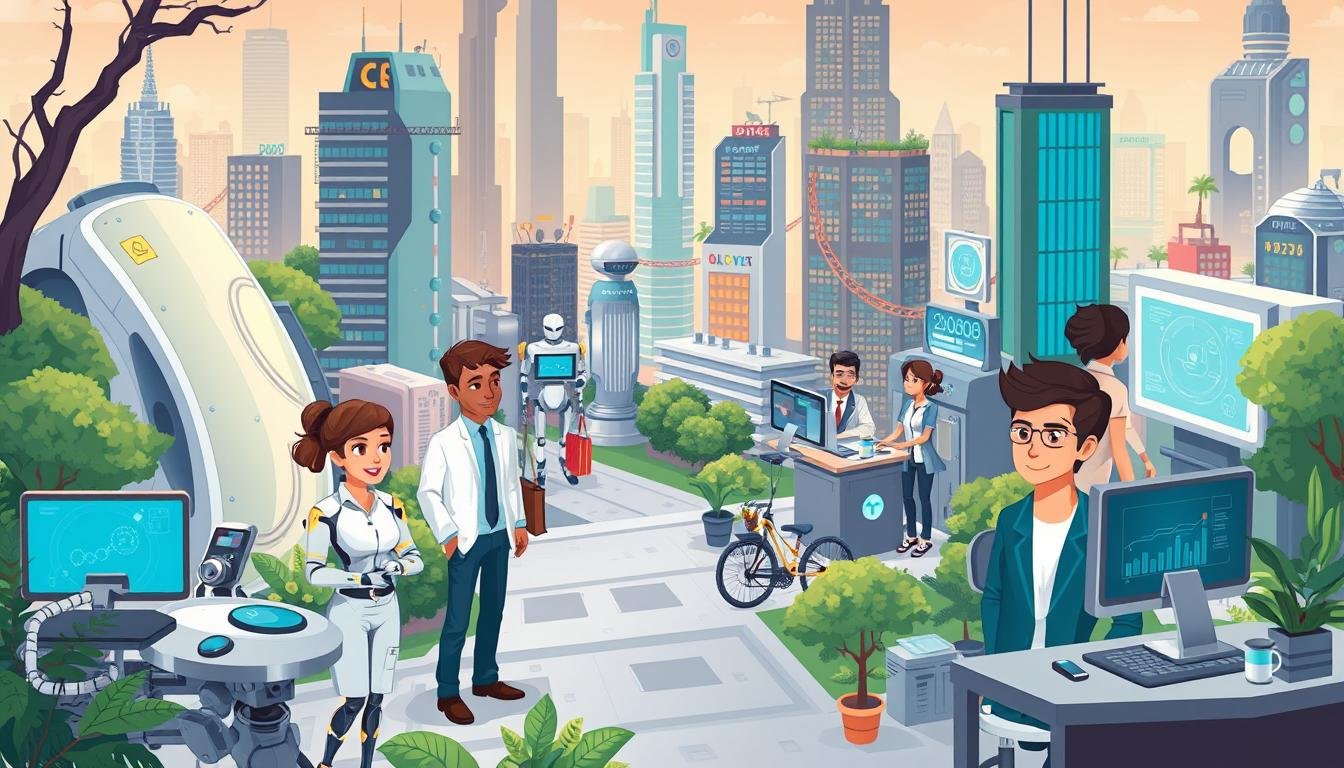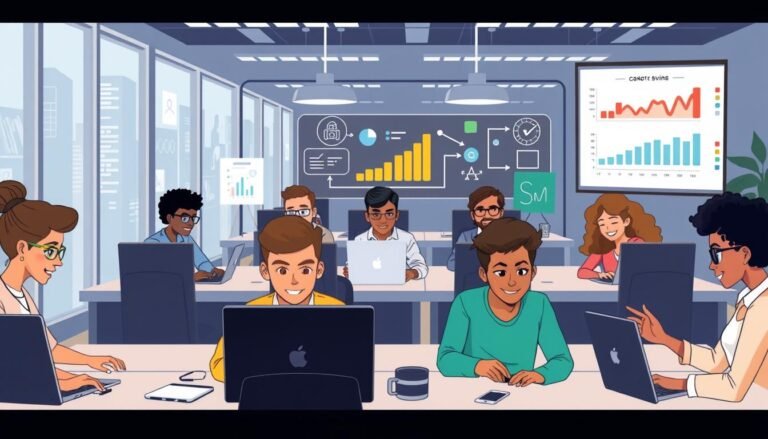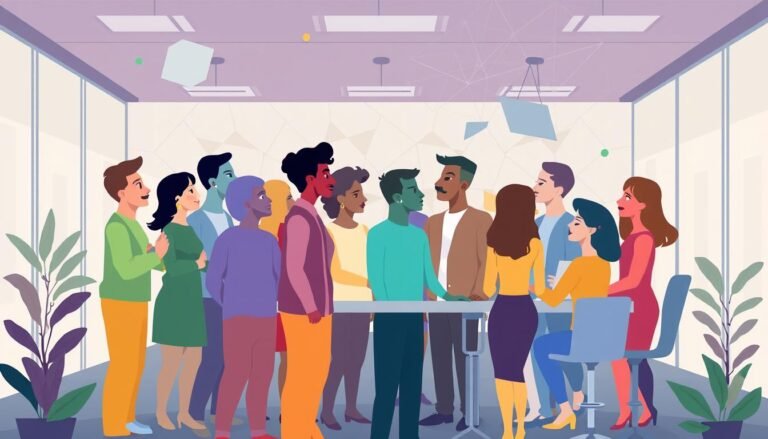Career Development in the Age of Automation
The workplace is changing fast. Automation and AI are reshaping how we work. By 2030, millions may need new jobs. This shift is bigger than past changes. It’s happening quicker too. Companies see the need to retrain workers as key.
A survey shows many HR leaders lack deep business knowledge. This gap matters for planning the future workforce. Many come from sales or operations backgrounds. This mix shapes how companies approach the future of work.
Businesses are working on ways to keep skills fresh. They want workers ready for change. Being open about plans helps build trust. It eases worries about job loss. Using AI fairly is vital for career growth. New tech like VR can open doors for learning.
Key Takeaways
- 375 million workers may need new jobs by 2030
- 66% of big companies see addressing skills gaps as a top priority
- 82% of executives favor retraining to fill skill gaps
- Only 16% of business leaders feel very ready for skills challenges
- 94% of European executives support retraining over new hiring
- 64% invest in retraining to boost productivity
Understanding Automation and Its Impact on Careers
Automation is changing the job market, leading to big changes in the workforce. It affects different industries in different ways. Some see job losses, while others find new opportunities. As AI becomes more common, workers must adapt to stay ahead.
What Automation Means for the Workforce
The rise of automation is changing the job scene. Since the 1980s, digital automation has widened job market gaps. Many jobs in production and clerical work have vanished or seen pay drops. But, workers with higher education often find benefits.
By 2025, automation could replace 85 million jobs globally. Yet, there’s hope. The World Economic Forum says 97 million new tech jobs will be created. This change highlights the need for ongoing learning and skill updates.
Key Industries Affected by Automation
Automation affects almost every field, but some feel it more. Manufacturing, transportation, retail, and customer service are seeing big changes. Yet, new chances are opening up in tech, finance, and healthcare.
| Industry | Impact of Automation | New Opportunities |
|---|---|---|
| Manufacturing | Job displacement in production lines | Roles in robotics maintenance and programming |
| Transportation | Potential job losses for drivers | Positions in logistics optimization and autonomous vehicle management |
| Retail | Fewer cashier positions | E-commerce specialists and data analysts |
| Healthcare | Automation of administrative tasks | AI-assisted diagnostics and telemedicine roles |
As automation changes industries, workers must keep learning. Sites like Coursera and LinkedIn Learning help with skills in new tech. The key to success is being adaptable and ready to learn new things.
Skills in Demand in an Automated World
Automation is changing the job market fast. Workers need to keep learning new skills to stay ahead. This means focusing on upskilling and reskilling.
The Importance of Tech Skills
Tech skills are now key in every field. IT and digital skills are growing fast. In the U.S. and Europe, basic digital skills are expected to jump by 69% and 65%, respectively.
Soft Skills That Matter
But tech skills aren’t everything. Soft skills like social and emotional abilities are also growing. They’re expected to rise by 26% in the U.S. by 2030. Skills like creativity and decision-making will also see a 19% increase.
Continuous Learning and Adaptability
The job market is changing fast. With automated jobs growing by 14% each year, workers need to keep learning. Job ads now mention career development 110% more than before.
- Focus on developing advanced IT skills
- Enhance social and emotional abilities
- Cultivate creativity and critical thinking
- Stay adaptable through continuous learning
To succeed in an automated world, focus on both tech skills and human abilities. This balance ensures you stay relevant in a market driven by technology.
Transitioning to New Roles
Career changes are becoming more common due to automation. To adapt, you need to develop new skills and look for new opportunities.
How to Identify Future Job Opportunities
Keeping up with industry trends is key for career growth. The need for AI and machine learning experts is growing fast. Companies worldwide are looking for these skilled workers.
- Manufacturing: Surge in AI-driven robotics
- Healthcare: Rise in demand for data analysts and IT specialists
- Finance: Increased use of AI for risk assessment and fraud detection
- Education: Need for professionals to develop AI-centric curriculums
Strategies for Reskilling and Upskilling
To stay relevant, consider these strategies:
- Leverage online learning platforms for specific skill acquisition
- Pursue certifications in emerging technologies
- Engage in mentorship programs for guidance and networking
- Participate in company-sponsored retraining initiatives
Many companies are investing in their employees’ growth. For example, Amazon’s Upskilling 2025 aims to spend $700 million on training for 100,000 U.S. employees.
| Skill Area | Demand Trend | Industry Focus |
|---|---|---|
| AI and Machine Learning | High Growth | Tech, Finance, Healthcare |
| Data Analysis | Steady Increase | All Sectors |
| Robotics Engineering | Rapid Expansion | Manufacturing, Healthcare |
| AI Healthcare Tech | Emerging Field | Healthcare |
By focusing on these areas and keeping your skills up-to-date, you can thrive in the changing job market.
The Role of Education in Career Development
Education is key in career growth as automation changes the job scene. With 16 to 54 million U.S. workers possibly needing new jobs by 2030, learning for life is vital.
Online Learning Platforms and Resources
E-learning sites offer flexible ways to grow professionally. The University of Illinois Springfield offers over 90 online degrees and certificates. These are in high demand for digital skills, especially in computer science and management information systems.
- 35% increase in college students aged 25-34 between 2001 and 2015
- 11% projected enrollment growth for this age group from 2015 to 2026
- The University of Dayton launched the first almost fully online Juris Doctor program in 2019
Certifications vs. Traditional Degrees
The debate on certifications versus traditional degrees goes on. Former President Barack Obama pushed for more post-secondary education. Yet, some say more education might not solve all job market issues. The success of learning methods differs:
| Learning Method | Effectiveness | Scalability |
|---|---|---|
| One-to-one instruction | High | Low |
| Traditional classroom | Moderate | Moderate |
| Personalized e-learning | High potential | High |
To stay ahead in a changing job market, mixing traditional education with e-learning is smart. It helps workers keep up with new career paths.
Networking in the Age of Automation
Professional networking has changed a lot with automation. Now, digital platforms are key for making career connections. We mix old ways with new digital methods to network.
Leveraging Social Media for Professional Growth
Social media is a big deal for networking today. LinkedIn, for example, has changed how we connect and advance our careers. AI helps find connections based on what you do online, making it more focused.
Automation makes it easier to keep up with professional contacts. Tools like Hootsuite help manage social media. This lets you stay active online without wasting hours.
Building Relationships in a Hybrid Workplace
Remote work has changed how we make professional connections. We now have virtual coffee chats and online events. Automated tools help with these, from sending invites to getting feedback.
| Networking Method | Benefits | Challenges |
|---|---|---|
| Virtual Coffee Chats | Flexible scheduling, global reach | Limited non-verbal cues |
| Online Industry Events | Access to diverse professionals | Potential tech issues |
| Social Media Engagement | Continuous connection, content sharing | Information overload |
Email automation lets you send personalized messages easily. This mix of tech and personal touch is crucial for networking today.
Embracing Remote Work Opportunities
Remote work has changed how we do our jobs. Digital nomads are at the forefront, enjoying flexibility and freedom. This shift is changing traditional office settings and opening new doors for workers around the world.
The Shift in Work Culture
Remote work has brought a big change in how we see our jobs. Companies are now thinking differently about office spaces. They’re investing in tech that helps with virtual teamwork. This change brings more flexibility but needs us to adapt to new ways of working.
- By 2030, up to 30% of current jobs could be automated
- In the US, this could lead to a 16% reduction in jobs over five years
- The gig economy is growing, with platforms like Upwork enabling remote opportunities
Tools for Effective Remote Collaboration
To succeed in remote work, we need to get good at using virtual tools. This includes project management software, video calls, and digital whiteboards. We also need to improve our skills in virtual communication, time management, and staying motivated.
“The future of work belongs to those who are willing to adapt and grow, actively shaping their career path in a constantly evolving world.”
As we dive into remote work, staying flexible and improving our skills is key. This approach helps us navigate the changing job market and grab new chances in the digital world.
The Gig Economy and Freelancing
The world of work is changing fast. More people are choosing freelance careers and becoming independent contractors. This is a big shift in how we make a living.
Understanding the Rise of Gig Work
Gig economy trends show a big increase in freelance work. By 2027, most U.S. workers might be freelancers. This change is thanks to digital platforms that connect workers with clients worldwide.
The gig economy offers freedom and chances to learn new skills. Workers can choose projects they like. They can also work with many clients at once.
| Year | Freelancers in U.S. | % of Workforce |
|---|---|---|
| 2020 | 57 million | 35% |
| 2023 | 59 million | 36% |
| 2027 (Projected) | 86.5 million | 50%+ |
Balancing Flexibility with Stability
Gig work offers flexibility but comes with risks. Income can be uneven. Benefits like health insurance may be lacking. Freelancers need skills in self-marketing and money management to succeed.
“58% of gig workers feel more in control of their careers compared to traditional employees.”
The gig economy is shaping the future of work. Both workers and companies are adapting to this new landscape. As this trend grows, finding ways to balance freedom and security will be key for those in freelance careers.
Navigating Job Security Concerns
In today’s fast world, job security is a big worry for many. The rise of AI and automation brings new challenges and chances for growth. Let’s look at how to stay relevant and build a strong career in this changing scene.
How to Stay Relevant in Your Field
To stay relevant, you need to keep learning and growing. Embrace lifelong learning to keep your skills sharp. Focus on learning new skills that work well with AI and automation, not against them.
For engineers, this could mean learning about ethical automation or pushing for responsible tech use.
Networking is also key to staying relevant. Connect with others in your field, go to conferences, and join online forums. This keeps you in the loop with new trends and chances.
It also opens doors to new job opportunities.
The Value of Diversifying Skills
Diversifying your skills is crucial for career resilience. Having a wide range of skills makes you more adaptable and valuable. Work on both technical and soft skills to make your professional profile strong.
| Technical Skills | Soft Skills |
|---|---|
| AI and Machine Learning | Emotional Intelligence |
| Data Analysis | Critical Thinking |
| Programming Languages | Creativity |
| Cloud Computing | Problem-Solving |
By focusing on these skills, you’ll be ready to face job security worries and succeed in an automated world. Remember, those who adapt to AI not only keep their jobs but also help their fields grow.
Mental Health and Well-Being in a Changing Job Market
The job market is changing fast, thanks to automation. This change is making workplace wellness more important. It’s key for workers going through career changes to manage stress well.
Recognizing the Stress of Career Transitions
Career changes can be stressful. A study showed that those worried about automation had more sleep problems. Young workers felt this stress the most, with even higher odds of sleep issues.
Strategies for Maintaining Mental Health
Stress management is vital for staying well at work. Here are some tips:
- Practice mindfulness to reduce anxiety
- Seek career transition support from professionals
- Engage in regular exercise to boost mood
- Maintain a healthy work-life balance
Interestingly, AI in manufacturing has helped mental health. It lowered depression scores by 1.643 points. This effect was bigger for low-skilled and older workers.
“In the age of automation, prioritizing mental health is not just beneficial, it’s essential for career resilience.”
Companies are now focusing on employee well-being. They offer counseling, stress management workshops, and flexible work hours. These efforts help workers adjust to new job market changes while keeping their mental health in check.
The Future of Work: What to Expect
The job market is changing fast, thanks to new technologies and planning for the workforce. Automation and AI are big players in this change. A McKinsey study says up to 15% of work hours could be automated by 2030. This brings both challenges and chances for workers.
Emerging Job Roles in an Automated Era
New jobs are popping up in data science, machine learning, and AI engineering. These jobs are in high demand. For instance, cybersecurity experts are needed more as companies use digital systems more.
Aspen University’s School of Business and Technology offers programs like the Master of Science in Innovation and Technology. These programs help students get ready for tech careers.
Preparing for Innovations in Technology
To do well in this new world, workers need to mix technical and soft skills. Skills like coding and data analysis are important. But so are creativity, emotional intelligence, and problem-solving.
Learning and being able to adapt are crucial. Up to 12 million workers in Europe and the U.S. might need new jobs because of automation. By always learning and staying open to change, people can succeed in the future job market.
Source Links
- What Is the Future of Career Advancement In the Age of Automation?
- Retraining and reskilling workers in the age of automation
- Understanding the impact of automation on workers, jobs, and wages
- The Future of Work: How Automation is Redefining Careers for Everyone
- Skill shift: Automation and the future of the workforce
- Upskilling in the Age of Automation
- Career Evolution in the AI Age: What Jobs Are on the Rise and Why
- Workforce Transitions in the Age of AI
- Adapting to Automation: Repurposing Your Workforce for Greater Efficiency – hefestus-slb
- What’s the Purpose of K-12 Education in the Age of Automation?
- How Online Education Helps Career Changers in Automation Age
- The Role of Network Engineers in the Age of Automation — Layer8Packet
- Networking in the Age of AI and Automation
- How To Future-Proof Your Career In The Age Of Automation
- Embracing the Age of Automation: Opportunities and Challenges
- The Future of Work: AI and Automation in the Career of the Young Generation
- Gig Economy and Freelancing: Redefining Traditional Employment
- The Gig Economy and Freelancing: Navigating the Future of Work
- THE FUTURE OF WORK: GIG ECONOMY AND FREELANCING
- Navigating Job Security in the Age of AI and Automation
- Empowering Workers in the Age of Automation — Occupational Health & Safety
- You’re facing job security concerns with automation. How do you navigate this technological shift?
- Wellbeing at Work and Productivity in the age of AI – Lecture by Professor Sir Christopher Pissarides – IFOW
- The Impact of Artificial Intelligence on the Mental Health of Manufacturing Workers: The Mediating Role of Overtime Work and the Work Environment
- Association between Workers’ Anxiety over Technological Automation and Sleep Disturbance: Results from a Nationally Representative Survey
- Jobs lost, jobs gained: What the future of work will mean for jobs, skills, and wages
- The Future of Work: How Automation and AI Are Shaping Career Paths
- The Future of Work: How AI and Automation Are Changing Business – Aspen University








